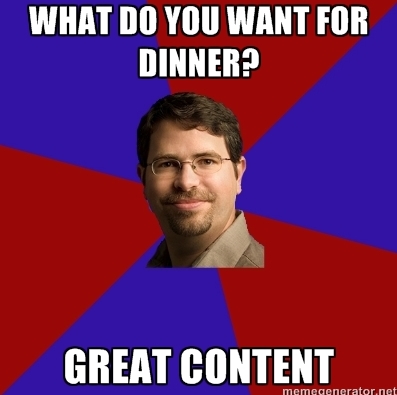If you’re a business owner or marketer, you’ll have read countless articles about” content being king” and why quality content is so important for search engine rankings, but what does “quality content” actually mean?
What is Quality Content?
The phrase is used so often, you could question whether people have forgotten what it really is, or even why it’s important. So what really is quality content? Well, the ultra-short answer to that question is this: It’s content that visitors to your website want to read! But where there’s an ultra-short answer that sums up an answer, there’s usually a better and more in-depth answer, and that is essentially what quality content.
Whatever you’re writing about on your blog or website, if you write with passion, knowledge, and in an engaging tone, chances are your visitors will stay on your page to read on. When they do, your bounce rates are lower and engagement is higher, and that’s great for your SEO. Think of the quality content as part of a perpetual loop: quality content leads to reader interest, which leads to better placement in search engines, which leads to more visitors reading your quality content, which brings us neatly back to the beginning.
The most important thing to remember when you’re writing content for your website or blog is that it needs to be interesting to read or add something positive to the user experience. Never write content with SEO in mind.
[Tweet “Quality content” and “Content is king”… What does it really mean??”]It’s a good time to take stock of what the phrase means, so we can continue to produce content that helps us achieve our marketing goals.
Here, we’ll look at why content quality is important, what it looks like, and explore some practical ways to ensure your content strategy stays on track.
Why Is Content Quality Important?
There are many good reasons why, such as increasing customer loyalty and your own credibility, but let’s focus on a single reason. It’s important because Google says it’s important.
Whatever your feelings about Google, no one can deny that it’s one of the best sources of inbound traffic.
Google matters because it’s the biggest search engine on Earth. No other search engine comes close and it will likely remain this way for the foreseeable future.
During a tracked period in November 2014, Google accounted for 93 percent of organic search traffic worldwide. All the other search engines only had single-digit percentage share.
It’s important to be aware of this statistic because when it comes to getting higher rankings and more traffic from Google, you’ll only succeed if your website contains high-quality content.
And we know that Google rewards high-quality content – because they tell us so. Its Webmaster Guidelines highlight the importance of quality content and Webmaster Tools is full of tips on how to produce quality content and things you should avoid.
 “Great content” is such a cliche phrase that it’s even subject of its own memes… often at Matt Cutts‘ expensive
“Great content” is such a cliche phrase that it’s even subject of its own memes… often at Matt Cutts‘ expensive
There’s another reason why we know Google cares a lot about content quality: the Panda algorithm.
Designed to improve Google’s ability to rank websites, the Panda algorithm measures many factors, but one of the most important is content.
Any site with low-quality content is downgraded in search rankings. The frequent updates to Panda also prove how important high-quality content is to Google.
What Are the Features of Quality Content?
Looking at Google’s Quality Rater Guidelines, we can see some key characteristics of quality content. Here’s a list of key points…
- Content written by an industry expert
- It contributes toward a great website experience
- Reasonably large word count – in-depth articles over 500/600 words (or many more)
- There are clear references and links to other quality sources
- The website clearly displays contact information
- Fresh content is regularly added and older content is regularly updated
In terms of keeping the Panda algorithm “happy”, avoid the following:
- Duplicate content (appearing on more than one page)
- Automatically generated content
- Content taken from other websites
- Content that is not relevant to the main topic of the page
- Keyword repetition / stuffing
Practical Takeaways for Producing High-Quality Content
Here are a few key strategies for ensuring you create a site that is rich in quality content…
Don’t repeat keywords too often. Instead, use synonyms and a variety of phrases. Content should read naturally.
Use a variety of rich media, including videos, images, and graphics to help explain each topic
Make sure all content is easy to digest, breaking up text with headings, bullet points, images, and videos.
Proofread your content before it goes live. Nothing ruins credibility like a simple spelling or grammatical mistake
A few other key areas to pay attention to…
- Write original content that offers your unique perspective on a topic
- Insert internal links to other website pages that expand on each topic
- Write longer articles that explore subjects in more depth
- Don’t include affiliate links and too many ads, or avoid them altogether
- Write clear and relevant titles that explain what readers can expect to find out
- Write for your target audience, and create content that people will want to share
- Don’t use technical jargon, if simpler language explains your topic better
Conclusion
There will always be a debate about what quality content means, and as search engines continue to update their algorithms, the value of content may change over time.
However, for the time being, it plays a crucial role in search engine optimisation and building a loyal audience. Put simply, you can’t afford to ignore it.
It may not be practical to stick to these quality content guidelines all of the time, but the more you can conform to Google’s best practices in the long term, the more chance you have of improving your search rankings and driving quality traffic to your website.
Your Say!
How do you define quality content? Let us know in the comments section below.

One thought on “What Does “Quality Content” Really Mean?”
Comments are closed.